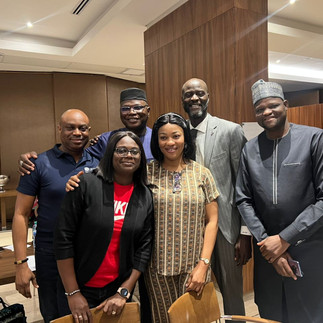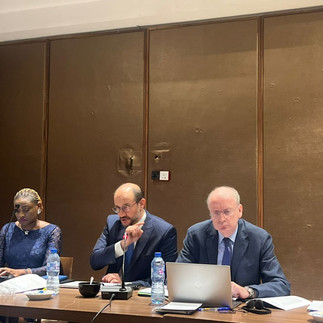Independent Experts Group Meeting on the Draft Supplementary Act Relating to the Cooperation on....
- May 21, 2023
- 3 min read
Independent Experts Group Meeting on the Draft Supplementary Act Relating to the Cooperation on the Suppression of Illicit Maritime Activities in ECOWAS
From 16 to 19 May 2023, in Lagos, Nigeria, a meeting of independent experts was held to consider the draft Supplementary Act Relating to the Suppression of Illicit Maritime Activities in ECOWAS. This project was carried out in the framework of the implementation of the ECOWAS Integrated Maritime Strategy (EMIS) in collaboration with the United Nations Office on Drugs and Crime (UNODC) through the Support to West Africa Integrated Maritime Security (SWAIMS) project.
The objective of this draft Supplementary Act is to promote the cooperation of ECOWAS Member States through the strengthening of the operational legal framework to combat illicit activities committed at sea.
The meeting was attended by representatives of ECOWAS Directorate of Peacekeeping and Regional Security, ECOWAS Directorate of Legal Affairs, Regional Maritime Security Center for West Africa (CRESMAO), Maritime Multinational Coordination Centers (MMCC) Zones E and G, UNODC, and by Consultants and Independent Experts.
During the opening ceremony, Mr. Francis Omiunu, National Programme Officer of UNODC, welcomed the experts appointed to reflect on the draft Supplementary Act Relating to the Suppression of Illicit Maritime Activities in ECOWAS. He noted that the meeting was another step in the continuing partnership between ECOWAS and UNODC in finding innovative solutions on cooperative mechanisms to address illicit maritime activities within the region.
He mentioned that UNODC, as an implementing partner in the SWAIMS project, remains committed to supporting the entire criminal justice system, from sea to land, in order to ensure that ECOWAS Member States are able to address the threats of maritime crime, including drug, human and arms trafficking, and to secure the waters of coastal States.
Colonel Abdourahmane Dieng, Head of the Regional Security Division of the ECOWAS Commission, in his opening remarks recalled the adoption of the Supplementary Act on the Conditions For The Transfer Of Persons Suspected Of Having Committed Acts Of Piracy And The Property and evidence associated with them by the ECOWAS Authority of Heads of State and Government at its 61st Ordinary Session in July 2022, and the significant drop in piracy In light of the current situation, It is now deemed necessary to put in place additional measures that would provide a range of options and innovative solutions to address all forms of maritime security problems in the maritime domain through enhanced cooperation.
He indicated that the thinking in this regard found expression in the recent UN Security Council Resolution 2634 (2022) which explicitly encourages the Gulf of Guinea states to structure operations to combat illicit maritime activities and to develop their capacity to protect their maritime domain, as well as Article 13 (3) of the Yaoundé Code of Conduct on the repression of piracy, armed robbery against ships and unlawful maritime activities in West and Central Africa, signed in Yaoundé on 25 June 2013 ("Yaoundé Code of Conduct").
Colonel Dieng concluded his remarks by requesting the dedicated support of the experts in the consideration of the draft Supplementary Act, towards an adoption by ECOWAS.
The meeting ended with the adoption of the report by the participants and the following recommendations including those to present the draft Supplementary Act as revised to the ECOWAS Commission as a working draft to ensure its ownership by all its competent services to sensitize management on the objectives that the draft Supplementary Act aims, to sensitize the management on the objectives that the draft Supplementary Act seeks to achieve in securing the ECOWAS maritime domain.
About SWAIMS
The Support to West Africa Integrated Maritime Security (SWAIMS) programme is a multi-country intervention, covering member states of the Economic Community of West African States (ECOWAS) under the European Union-West Africa Regional Indicative Programme Benin, Burkina Faso, Cabo Verde, Côte d’Ivoire, The Gambia, Ghana, Guinea, Guinea Bissau, Liberia, Mali, Niger, Nigeria, Senegal, Sierra Leone, Togo, as well as Mauritania with a specific focus on coastal countries.
The project implementation period is from 2019 to 2023.






















Comments